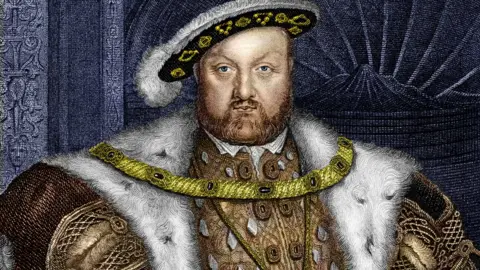Henry VIII spent 'almost entire year's tax' on Christmas
 Getty Images
Getty ImagesHenry VIII spent almost an entire year's tax revenue celebrating Christmas in the first year of his reign, National Archive files reveal.
Expenses for 1509 show the 19-year-old king spent the equivalent of £13.5m on a series of lavish events. Total revenue for the year was £16.5m.
The money went on food, entertainment and gifts - including generous individual presents for staff.
Beneficiaries included choir boys, musicians, actors and servants.
The king paid his blind court poet, Master Bernard André, £5 - the equivalent of £2,400 in today's money, and another £1, now £483, to a woman who brought a perfumed ball to the palace residences to keep the air fresh.
One goldsmith was also offered £83 for gifts by the monarch, worth £41,000 in the present day economy.

You may also like:

The children of the Chapel Royal were rewarded with a very generous £2 - worth £967 in modern prices - for singing the hymn Gloria in Excelsis on Christmas Day.
The monarch was staying at Richmond Palace, a royal residence on the river Thames, when the payments were made.
 Public domain
Public domainDr Sean Cunningham, Head of the Medieval Records team at the National Archives, said: "These records really do allow us to see the amazing wealth that surrounded the early Tudor kings.
"Right at the start of Henry VIII's reign, when he was still a teenager, it is fascinating to get an impression of his generosity and sense of fun from these documents showing what he spent his money on.
"In 1509, the familiar figure of the often-married, overweight, paranoid and grumpy king of the 1540s could not be further from the bright and vigorous young ruler."
The royal chamber expense books will be published online in their entirety by the National Archives in Spring 2018.
